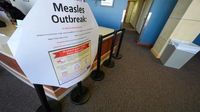As the United States grapples with a resurgence of measles affecting vast areas in the Southwest, neighboring countries are facing their own outbreaks. Canada has reported over 730 cases of the disease in 2025, marking this outbreak as one of the worst in the country since the 1998 declaration of virus 'elimination'. Meanwhile, Mexico has recorded nearly 360 cases and one death, primarily in the northern state of Chihuahua, according to health authorities.
Many of the communities experiencing these outbreaks are home to large Mennonite populations, which public health officials believe are linked to the spread of the virus. International transmission is causing concern among epidemiologists, who worry that sporadic outbreaks across the border with the USA will hinder efforts to contain the virus. "It’s just a line on a map that divides them—we share air, we share space," stated Lisa Lee, an epidemiologist from the Virginia Tech Institute.
The situation in the United States is exacerbated by declining vaccination rates, which have made the population more vulnerable to this highly contagious virus. Lee added, "If we don't have a buffer or herd immunity to keep the virus out, we will be at risk as long as any of our neighbors are in danger."
The outbreak in the Southwest shows no signs of slowing down. Since the end of January 2025, the virus has infected more than 560 people in Texas, 63 in neighboring New Mexico, and a dozen in Oklahoma. Kansas has also reported over 30 cases, which public health officials suspect may be linked to the Texas outbreak.
Officials across several states have issued warnings to their residents. The governor of Nebraska has announced a measles response plan, even though no cases have been recorded in the state yet. Earlier this month, New York State officials issued travel advisories to Ontario and several U.S. states, cautioning that measles is "just one car ride away."
The virus has spread so widely in North America this year that the Pan American Health Organization issued a warning in late February, indicating that the region's status as measles-free is under threat if countries do not strengthen their vaccination efforts and outbreak responses. Their risk assessment concluded that measles poses a "high" risk to public health in the Americas.
The outbreak in Canada, which began in late 2024, is reported to be "disproportionately affecting" individuals from Anabaptist communities, including Mennonites and Amish. This situation may be traced back to a large Mennonite gathering in Ontario last autumn, according to the Ontario Ministry of Health.
The largest outbreak in the United States has been traced to a Mennonite community on the western outskirts of Texas. Regions with smaller outbreaks, such as Oklahoma and southwestern Kansas, also have significant Mennonite populations, as noted by Steven Nolt, who studies Mennonite and Amish groups at Elizabethtown College in Pennsylvania.
While there is no religious doctrine prohibiting vaccination within the Mennonite faith, many community members tend to avoid interactions with the medical system and adhere to traditional natural remedies. Highly contagious viruses like measles tend to thrive in close-knit, under-vaccinated communities. In 2019, measles spread through a large Orthodox Jewish population, becoming the largest outbreak in recent U.S. history.
Even if the virus does not penetrate a wider community, measles can infect hundreds by moving between groups of vulnerable individuals. Outbreaks can span across borders and extend for hundreds of miles if the virus finds a network of unvaccinated communities. This appears to be part of the current resurgence of measles.
The virus was initially introduced to a Mennonite community in Chihuahua by a 9-year-old boy who had visited Texas with his family, according to Rodolfo Cortes, a representative of the state’s Ministry of Health. Mennonite groups across North America are notably interconnected, Dr. Nolt explained. Although he is not aware of any large organized gatherings between the groups, Mennonites frequently cross borders to visit extended family.
While a direct link with Canadian cases has not been established, the same strain of the virus has been identified in all three countries, as reported at a recent meeting of the Centers for Disease Control and Prevention. The continued spread of measles in North America raises urgent public health concerns, as officials strive to contain outbreaks and encourage vaccination across communities.


